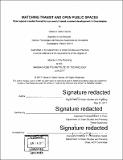Matching transit and open public spaces : open space oriented transit for successful transit oriented development in Guadalajara
Author(s)
Sainz Caccia, Carlos A. (Carlos Alberto)
DownloadFull printable version (25.16Mb)
Alternative title
Open space oriented transit for successful transit oriented development in Guadalajara
Other Contributors
Massachusetts Institute of Technology. Department of Urban Studies and Planning.
Advisor
Brent D. Ryan.
Terms of use
Metadata
Show full item recordAbstract
The way we perceive the urban environment affects the choices we make and therefore our behavior. This fact has an important effect when we navigate a city. How urban spaces are laid out will influence our decisions and have repercussions in our travel choices. There is therefore a connection between urban spatial experience and transportation systems. With a large number of cities considering transit oriented development (TOD) - an urban model whose goal is to align urban development to public transportation patterns by creating walkable, mixed and diverse neighborhoods - as the primary planning solution to solve their accessibility problems, the connection between the urban image and the transit system is crucial. If planners want to bring people closer to transit systems and increase ridership, they will need to improve the perception people have about the system and further construct a modified set of travel preferences. Both urban space and the process of navigation are, in general, composed linear features related to movement (paths) and point features that define origins and destinations (nodes). Within the different types of nodal elements, open spaces have a particular condition; their openness allow people to perceive a larger portion of their surroundings, easing the process of wayfinding and enhancing the sense of place, which is highly valuable for the construction of true communities. This thesis explores the role of open spaces, not only as attractive urban amenities and recreational spaces, but as organizing elements of the territory and anchors for the transit system arrival points. I explore Guadalajara, Mexico, a city with an important central network of open spaces. The city is currently making a significant investment in transit and is looking towards TOD for its planning solutions. I intend to use Guadalajara as a mean to show how open public spaces can be used as primary elements to structure transit systems and to enhance the creation of place around stations.
Description
Thesis: M.C.P., Massachusetts Institute of Technology, Department of Urban Studies and Planning, 2017. Cataloged from PDF version of thesis. Includes bibliographical references (pages 93-98).
Date issued
2017Department
Massachusetts Institute of Technology. Department of Urban Studies and PlanningPublisher
Massachusetts Institute of Technology
Keywords
Urban Studies and Planning.